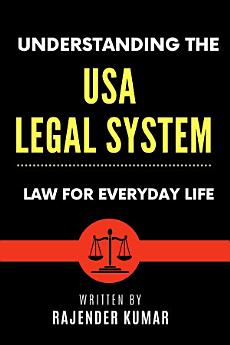Understanding the USA Legal System: Law for Everyday Life
About this ebook
Written for general readers, newcomers to the U.S., students, and anyone curious about the rules that underpin society, this comprehensive guide demystifies the legal system with clarity and compassion. Whether you’re seeking to understand your rights during a police encounter, the essentials of property ownership, or the complexities of starting a business, this book offers practical insights rooted in real-world scenarios.
Author Rajender Kumar brings a unique analytical perspective, blending his deep respect for the law’s role in shaping communities with an approachable, story-driven style. Drawing on pivotal moments like the landmark Miranda v. Arizona ruling—which established the right to remain silent—and everyday realities such as navigating landlord-tenant agreements, Kumar highlights how the law is both a shield and a tool for empowerment. By weaving in global perspectives—from the American Miranda warning to Japan’s restorative justice practices—Kumar underscores the universality and diversity of legal principles, ensuring readers appreciate the cultural and historical contexts that inform today’s legal landscape.
The book also breaks down complex legal terminology—terms like misdemeanor, felony, and burden of proof—making them accessible to all. Each chapter blends vivid examples, historical anecdotes, and actionable guidance, ensuring readers not only understand the law but also how to navigate it with confidence.
Whether you want to safeguard your rights, resolve everyday disputes, or simply become a more informed citizen, Law for Everyday Life is an indispensable resource. Uncover the vital story of how law shapes your world—order your copy today and step confidently into the framework that protects and empowers us all.
Ratings and reviews
- Flag inappropriate
About the author
Rajender Kumar is a seasoned data professional with over a decade of experience, blending analytical expertise with a passion for social understanding to illuminate the U.S. legal system. Holding degrees in computer science and statistics, Rajender has worked with Fortune 500 companies and non-profits, using data to uncover societal trends and guide decision-making. His unique perspective—melding data analytics, public policy, and civic education—offers clear, practical insights into the complexities of law, making it accessible to everyday citizens.
Raised in a multicultural household, Rajender grew up immersed in discussions about rights, responsibilities, and the rule of law, fostering an early appreciation for how legal frameworks shape lives. After moving to the United States, he faced challenges navigating legal documents like rental agreements and workplace contracts, experiences that highlighted the need for clear, relatable legal knowledge. These personal encounters fueled his mission to demystify the law for others.
Rajender’s career reflects his commitment to bridging technical expertise and public understanding. He has designed data-driven policy workshops, mentored students in civic technology, and led community outreach to empower immigrants and newcomers. His work focuses on how laws impact daily life—whether in property disputes, law enforcement interactions, or small business ventures—translating abstract regulations into tangible realities. By drawing on his diverse experiences and those of his friends, colleagues, and neighbors, Rajender brings a global perspective to his writing, emphasizing both universal legal challenges and the distinct features of the American system.
His book, *Understanding the USA Legal System: Law for Everyday Life*, is more than a guide; it’s an invitation to engage with the legal foundations of communities, ask informed questions, and advocate effectively. Rajender’s storytelling and real-world examples make complex concepts clear and actionable, reflecting his respect for the law’s role in promoting justice and social cohesion. He believes legal knowledge empowers everyone, not just lawyers or policymakers. Through his work, Rajender inspires a new generation of confident, informed citizens, fostering legal literacy and civic engagement in a dynamic world.
